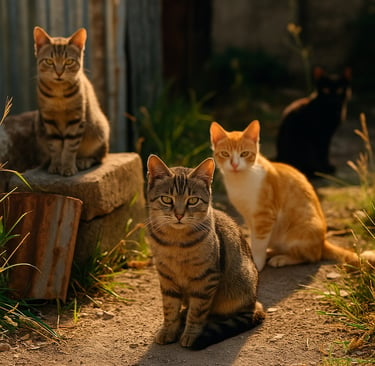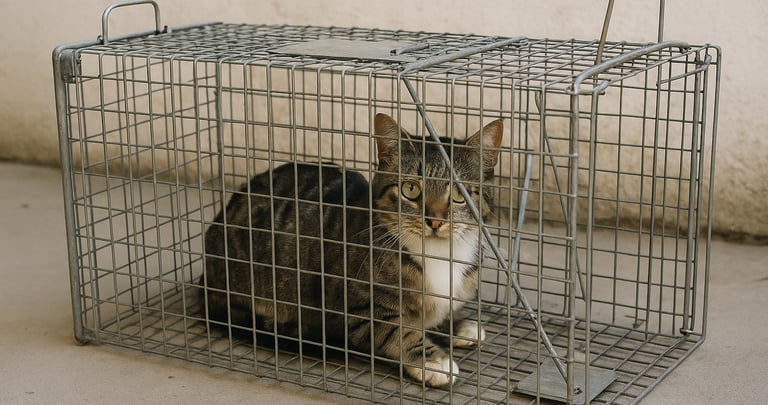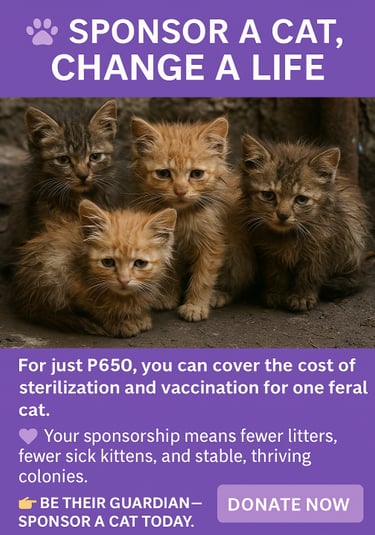
Trap–Neuter–Return (TNR) at AATFB
What Are Community Cats?
Community cats, often referred to as feral cats, are unowned domestic cats that live outdoors. Unlike house cats, they are not socialized to people, making them unsuitable for adoption. Instead, they form colonies in neighborhoods, farms, or business areas where food and shelter are available. These cats play an important role in controlling rodent populations but, without intervention, their numbers grow rapidly due to a lack of sterilization.
Why TNR?
Trap–Neuter–Return (TNR) is the most effective, humane, and sustainable solution to managing community cat populations.
Stability of Colonies
Removing cats only leads to others moving in (known as the “vacuum effect”), while TNR maintains stable, healthier colonies.
Community Engagement
TNR encourages neighborhood involvement, building compassion and responsibility toward animals.
Moral and Ethical Approach
Unlike culling, TNR allows cats to live healthy lives while preventing overpopulation.
Public Health and Safety: Sterilized cats are vaccinated against rabies and other diseases, reducing public health risks.
How Does TNR Work?
Trapping: Cats are safely and humanely trapped using specially designed cages.
Neutering/Vaccination: Licensed veterinarians sterilize the cats under anesthesia and vaccinate them against rabies and other contagious diseases.
Ear-Tipping: A small notch is made in the cat’s left ear. This universal sign shows the cat has been sterilized and vaccinated, preventing repeat trapping.
Return: After recovery, the cats are returned to their original outdoor location. They continue to live naturally, but without reproducing, thereby controlling the population over time.
Why Not Euthanasia?
Killing cats only opens territory for new, unsterilized cats to move in (the vacuum effect). The population quickly rebounds, and the cycle of suffering continues. TNR stops the cycle by allowing cats to live out their lives without adding to the population.
Healthier cats with reduced risk of disease.
Fewer litters of kittens struggling to survive outdoors.
Reduced nuisance behavior such as yowling, fighting, and spraying.
A balanced environment where cats play a role in rodent control without overwhelming communities.
The Benefits of TNR
How You Can Help
Every cat sterilization has a cost. Sponsoring a TNR helps reduce suffering and keeps community cats healthy.
Sponsor a Cat: A contribution of P650 per feral cat covers sterilization and vaccination.
Volunteer: Assist with trapping, transport, and recovery.
Report Colonies: Inform us of unsterilized colonies so we can include them in future campaigns.
Spread the Word: Encourage friends, neighbours, and businesses to support TNR instead of inhumane alternatives.
Please Remember
Community cats are not suited to indoor homes or shelters, as they are not socialized to humans. Do not take them to shelters where they may be euthanized. Instead, support TNR initiatives that allow them to live safely in their environment.









AATFB offers humane trap cages to help communities with Trap–Neuter–Return (TNR). Cages are available by referral only through our foster network and partner vets, ensuring they are used for sterilization and vaccination purposes.
Hire a cage: P500 per week, with a refundable deposit (P2000) when the cage is returned in good condition and accompanied by vet receipts showing the number of cats processed.
Full-service option: For P750 per cat, our team will handle everything — from trapping to veterinary care to safe return — giving you peace of mind that the cats are cared for humanely.
By hiring a cage or choosing our full-service program, you help reduce the suffering of community cats and support long-term population control.
Trap Cage Hire


